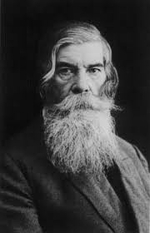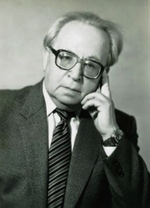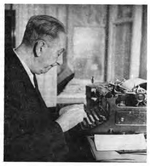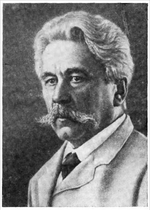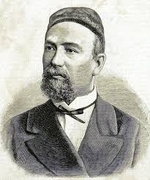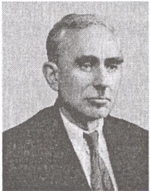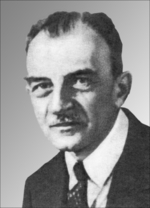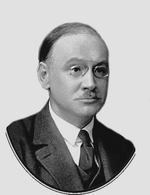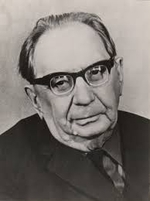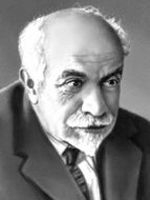Articles
Bekhterev Vladimir (1857–1927)
Bekhterev Vladimir (1857–1927) – Russian psychologist, psychiatrist, physiologist and neuropathologist.
In 1873, he graduated from the Vyatka gymnasium; in 1878, he graduated from the St. Petersburg Medical and Surgical Academy (now the Military Medical Academy), in the fifth year of education he participated in the Russian-Turkish war, providing assistance to the wounded. In 1881, B. defended his PhD dissertation ‘Experience in the Clinical Study of the Body Temperature at Some Forms of Mental Illness’. In 1884-85, he completed an internship in Germany, France, and Austria, including work under the supervision of one of the best neurologists of that time P. Fleksig, to whom he later dedicated his two-volume monograph ‘Pathways of the Spinal Cord and Brain’ (1900); he also worked at the W. Wundt's laboratory and at the clinic of J.-M. Charcot.
Read More
Belenky Moses (1910–1996)
Belenky Moses (1910–1996) – publicist, translator, theatre administrator.
He finished Hebrew school and graduated from the Minsk Teachers-Training Professional School. In 1932, he graduated from the Hebrew Department of the Faculty of Literature at the Moscow State Teachers-Training Institute named after Bubnov. In the course of his studies in Moscow, he was invited to GOSET (State Hebrew Theatre) to make lectures in philosophy. From 1932 till the moment of closing the theatre in 1939, he was Director of the Moscow State Hebrew Theatre School at GOSET; he taught more than 1500 actors for Hebrew theatres of the U.S.S.R. He worked as editor in the Der Emes Publi
Read More
Belyaev Eugeny (1895–1964)
Belyaev Eugeny (1895–1964) – Arabist, Doctor in History.
He served in the Red Army in 1918 – 1920. In 1922, he graduated from the Moscow Institute of Oriental Studies. Since 1924, he has taught at the same institute; he made lectures in ancient, medieval and modern history of Arabs. From 1945 till 1955, he was the Head of the Chair of History and Economics of the countries of Near and Middle East at the Moscow Institute of Oriental Studies. He also taught at the Military Institute of Foreign Languages, and at the High Diplomatic School of the Ministry of Foreign Affairs of the U.S.S.R. In 1954-1957, he visited countries of Western Europe; for instance, he was in Cambridge and Munich. He published about 150 works, and edited about 30 books.
Read More
Beneshevich Vladimir (1874–1938)
Beneshevich Vladimir (1874–1938) – Byzantinist, archeographer, paleographer, historian of canonic law. Prof. of the St. Petersburg University, Head of the Chair of Ecclesiastic Law (1909), Prof. of the St. Petersburg Spiritual Academy (1907-1909), of the Military Law Academy (1909-1911). Correspondent Member of the Ac. of Sc., Department of History and Philology (1924). Member of the Strasburg Ac. of Sc. (1914), Bavarian Ac. of Sc. (1927), Berlin Ac. of Sc. (1929). Honourary Doctor of Law of the University of Athens (1912), Honourary Member of the Athens Society for Byzantine Research (1927). Scholar and active administrator of research work, member of numerous academic committees.
Read More
Berezin Ilya (1819–1896)
Berezin Ilya (1819–1896) – Orientalist, specialist in Iran and Turk studies.
From 1834 till 1837, he studied Arabic and Persian languages at the Kazan' University, under the supervision of Prof. F. Erdman and Prof. A. K. Kazem-bek. In 1837, Berezin graduated from the Historical and Philological Faculty. In 1842, he got his Master degree in Oriental literature and languages; in the same year, together with F. Dittel (1816-1848) he was sent to the East to improve his knowledge. For the three years he has visited Persia, Mesopotamia, Syria, Palestine, and Egypt. Almost a year he lived in Constantinople, learning Turkish language. In 1846, he got a position of Ass. Professor at the Chair of Turkish at the Kazan’ University.
Read More
Bernadsky Victor (1890–1959)
Bernadsky Victor (1890–1959) – historian in Old Russia.
He studied at the St. Petersburg University, but graduated from it by correspondence, after he was excluded from the fourth year (in 1912) for his participation in the students’ protests. In 1924-1959, made lectures at the Leningrad Herzen Teachers-Training Institute (1924-1925 – Ass.; in 1928-1945 – Docent at the Chair of Historical Methods, in 1942-1949 – Head of the Chair of the U.S.S.R. History, in 1955-1959 – Prof.). He also had administrative positions: in 1941-1944 – Deputy Director on Research, in 1945 – 1946 – Deputy Director on Educational Work at the same institute. In parallel, in 1943 – 1946, he made lectures at the Leningrad State University.
Read More
Bizilli Petr (1879–1953)
Bizilli Petr (1879–1953) – historian medievalist, philologist.
His supervisor was E. N. Shchepkin; B. graduated from the Novorossiisk University. In 1912, he defended his thesis ‘Salimbene. Essays on Italian Culture of the Thirteenth Century’. He made lectures at the Novorossiisk University in Odessa. Since 1920, in emigration, he worked at the University of Skopje, then, since 1924, at the Chair of Modern and Contemporary History, University of Sophia. He studied various aspects of medieval religious mentality, the history of Franciscans, Joachime of Fiore and his followers, specifics of mysticism in the context of individuality, and so on. A special interest of B. to individuality was manifested in his disagreement with the idea by L. P. Karsavin on ‘typicality’ of genius for his epoch.
Read More
Bogaevsky Boris (1882–1942)
Bogaevsky Boris (1882–1942) – philologist, specialist in Classic history and religion, archeologist.
He was from a gentry family of the Kharkov Region. After finishing the Tenth St. Petersburg Gymnasium, he entered the Classical Department of the Historical and Philological Faculty of the St. Petersburg University; he graduated from it with the Diploma of the First level in 1907, and was invited to prepare himself for Prof. In October 1907, he was sent abroad with research and educational aims. For two years and a half, he passed readings in Heidelberg, Munich, and Berlin; he gathered materials for his thesis in Italy, mainland Greece, and on the Crete. Having returned to St. Petersburg, he made lectures at the High Female Courses, at the Psycho-Neurological Institute, and at the private Gymnasium of M. N. Stoiunina; he was member of the Archeological, Geographical, and Historical Societies.
Read More
Bogatyrev Petr (1893–1971)
Bogatyrev Petr (1893–1971) – folklorist, ethnographer.
After the gymnasium in Saratov (with a silver medal), in 1912, he entered the Historical and Philological Faculty of the Moscow University. In 1918, he graduated from it with the diploma work ‘Zharty and Facetiae of the Seventeenth – Eighteenth Centuries’. Took part in folklore and ethnographic expeditions. Member of the Moscow Linguistic Circle. In 1918-1919, Employee of the Library Department of the People's Commissariat for Education.
From 1921 to 1939, he worked in the Soviet Embassy in Czechoslovakia as Assistant and translator. He was a member of the Prague Linguistic Circle (1926). He wrote reviews and articles for the ‘Central Europe’ Magazine.
Read More
Bogoraz (Tan) Vladimir (1865–1936)
Bogoraz (Tan) Vladimir (1865–1936) – social figure, scholar and organizer of research activity, linguist, ethnographer and anthropologist, historian of religion, poet, writer and journalist, Professor, Correspondent Member of the Ac. of Sc. of the U.S.S.R. Before 1917, he was actively involved into political activity: since 1881, as a member of ‘Narodniki’ revolutionary movement, in 1905 – in the ‘Peasants Union’, in 1906 – in the ‘Labour Group’ (Trudoviki) of the State Duma; worked for newspapers as journalist under the pseudonym ‘Tan’. In 1889, he was arrested and sent to exile to Srednekolymsk for ten years. There he started his studies of the life of the native population of the Far North; for theree years he has wandered with Chukchi nomads. B. took part in the Jesup North Pacific Expedition headed by Franz Boas.
Read More
Showing 21-30 of 351 items.

